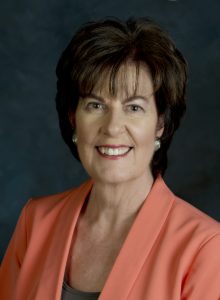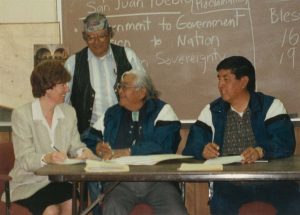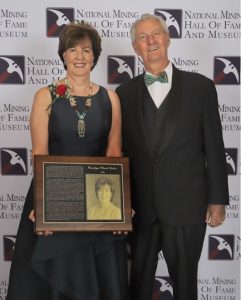
Carolyn Clark Loder is a seasoned leader in the mining and natural resources industry, serving on the boards of directors of K2 Gold Corporation and Integra Resources, where she also chairs its Environment, Social, Governance Committee. As a board consultant and expert witness in mineral rights and Tribal engagement, she advocates for Indigenous inclusion at the highest levels of corporate decision-making.
Earning her Master of Legal Studies in Indian Law from ASU Law in 2011 was a transformative experience that broadened her perspective and deepened her commitment to equity and education. The first woman inducted into the National Mining Hall of Fame in 2023, Carolyn continues to champion change in an industry historically led by white men — ensuring that all stakeholders, especially First Nations, have a seat at the table.
Q: What has your journey been like since graduating?
A: Upon getting my MLS in Indian Law, it opened up a broader view of the world that has enabled me to influence corporate America with that vision. As a non-Indian, I admit I knew nothing of our colonial past as I was indoctrinated into learning only the history of MANkind. As a young girl I could find no women heroines in history – they were all men. And all white men. And, I knew nothing of our First Nations.
Being inducted into the National Mining Hall of Fame as the first living woman — and the first woman in 100 years — is not only amazing to me, but more a reflection of our past in that it has always been white men and corporate leaders who were recognized. I have seen a change in perspective over the last 40 years that wealth seeking is not the end all. All stakeholders are important in projects, not just the shareholders. I am fortunate to serve on publicly traded boards that recognize this shirt and support my belief that our First Nations have a voice and can bring positive change to the table.
I also was able to help influence a decision that brought a Tribal member onto a publicly traded Board. That is the next step – to have Tribal members on publicly traded Boards so that their advice and opinions are incorporated into decision making. Having them as employees is not the same — it does not effectuate change at the top.
Q: What is the most valuable lesson you learned in the classroom that has helped you in your career?
A: The lesson I learned in the classroom is that Indian Law is complicated — very complicated — and despite my degree, I still know very little. The general public knows even less. I always have stories to tell folks and I am pleasantly surprised at how much interest people have and the questions they ask about Indian law. I wish the basics of Indian Law were taught in elementary school, particularly in the western states. It should be mandatory in high school civic classes.
Q: Is there anything you’ve learned after graduating that you wish you had learned in class?
A: I miss the CLE classes that were always on current topics. They were so informative and I felt like I was still in the mainstream of learning. Without those classes, I lost touch with the Indian Law program, other than continued contact with a few students.
I also wish I had learned about the Tribes in Arizona. Having lived here for 30 years and being born in California, I still know so little of the Tribes of my homeland.
Q: What originally made you choose ASU Law?
A: Clearly, it was the Indian Law program and the staff and professors and Heidi McNeil Staudenmaier of Snell Wilmer. She and I worked together on a landmark Tribal land exchange in New Mexico that returned 20,000 acres of ancestral lands to two Tribes. She told me about a fairly new degree at ASU called an MLS. She suggested I speak to Associate Dean Gary Birnbaum to see if I could focus my course work entirely on Indian Law. I had completed my first-year law courses elsewhere years earlier, so those credits were already in place. Upon acceptance, I truly felt welcomed, particularly being the ‘older’ one in the classrooms. And the students were phenomenal. They welcomed me, and I made sure I always found time for them to share their concerns. Being older, I was a safe haven for them to discuss their fears, their problems and their hopes and dreams. I had not anticipated that my advice would even be sought after — I truly thought they would be disinterested. But, it was the opposite.
Q: What advice would you give to current students?
A: I would say that they are truly blessed being in the Indian Law program at ASU, especially because it focuses on Indian Law versus Indigenous Law. There is so much to learn in the U.S. that I feel that if I took the global approach, I would not have learned as much as I did -– which is still very little. Focusing on the U.S. has given me the advantage to apply that knowledge to specific projects, situations and decisions.
Q: What’s something you’d like people to know about you? (This can be a fun fact or anything else you’d like to share!)
A: I was married years ago in Antarctica to a Canadian on lands claimed by Argentina and not recognized by the U.S., by a Russian Ice Breaker Captain. My husband was born in Labrador, before it joined Canada as part of the province of Newfoundland and Labrador. He was born in the northern community of Hopedale, which is now a National Historic Site and legislative capital of the autonomous Inuit region of Nunatsiavut. His father ran the trading post and his mother cared for the Indigenous Peoples of Labrador with only a nursing degree and a dog sled. She received the Order of Canada by Her Majesty Queen Elizabeth II, recognizing her dedication to the Native community and service to the Nation. Good footsteps for me to follow.
Q: Is there anything else you’d like to add?
A: I have had a very blessed life in that I grew up in a rural area with no knowledge of the world and at age 18, I sailed around the world with World Campus Afloat. That exposure changed my life forever. I became a sponge for knowledge and with supportive parents, family, friends and community I was able to pursue my hopes and dreams. I wish everyone had such a support group.


